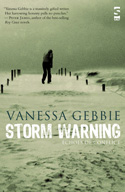
 In a recent interview on
her publisher's blog, Vanessa Gebbie said she is interested in "the consequences, the fallout" of events.
She talks about how she was shaped by and continues to be heavily influenced by the unspoken wartime
experiences of her adoptive father, a decorated veteran of WWII. "…Inevitably,
those things that preoccupy me will make their way to the surface, whether I am writing about a beach
holiday in Benidorm or the aftermath of a mining accident," she noted.
In a recent interview on
her publisher's blog, Vanessa Gebbie said she is interested in "the consequences, the fallout" of events.
She talks about how she was shaped by and continues to be heavily influenced by the unspoken wartime
experiences of her adoptive father, a decorated veteran of WWII. "…Inevitably,
those things that preoccupy me will make their way to the surface, whether I am writing about a beach
holiday in Benidorm or the aftermath of a mining accident," she noted.
Her influences and interests naturally inform her latest collection, Storm Warning, which was published in late 2010 by Salt Publishing. The twenty stories within explore "the echoes and aftershocks of human conflict in a series of powerful stories in which the characters are tested, sometimes to breaking point."
Gebbie, the daughter of a student nurse and a travelling salesman, was given up for adoption at birth. She grew up in Wales with her adoptive parents. Her short fiction, published in many countries, has won numerous awards and has been broadcast by the BBC. Her teaching and facilitating has led to the publishing of anthologies of work by by refugees and the homeless in her home city of Brighton and in Hove, Sussex, UK. Her novel in progress won a first prize in the 2007 Daily Telegraph Novel Competition. She is the author of a previous collection of short fiction, Words From a Glass Bubble. In November, Bloomsbury will publish her new novel, The Coward's Tale.
It is with great pleasure that we reprint here Vanessa Gebbie's story, "The Wig Maker".
There is no story here, only truth. I was taught the value of truth. I will start, therefore, with three truths. First, I am called Pearl. Second, woodpeckers never fly over the ocean. Third, bamboo is stronger than muscle.
I keep a pair of mother's shoes where I can see them out of the corner of my eye, in my workroom. Only out of the corner, for that way her ghost can stand in her shoes and does not know I am watching. She wavers above those shoes like she cannot decide whether to be here or not. That is unlike her. She was so definite. So sensible.
Those who see the value of truth will see truth. This is what my mother taught me, and indeed it is so. It is not a comfortable thing, knowing the value of truth, for it weighs heavy, as heavy as the growling clouds that send us rain from their bellies.
I wonder about the truth in the sacks of black hair that wait under my workbench. I wonder about its blackness, its oiliness, and sometimes, when I lift a handful to my nose, I smell cooking, or perfume, or sometimes the fresh air from some mountain village.
I see the truth when I hook the hair into the silk caps that come from the west, with their little ribbons. Someone, I forget who, told me a long time ago that the wigs are for beautiful ladies who dance, or stand on wooden stages high above the people and recite long speeches that have the people mesmerised. I think this as I hook the hair through and over, through and over, each skein matching the last, my fingers working so fast now that they are a blur … and my mother rises up in the dust that wavers in the corner of the room, and stands there, squat, looking at the hair.

This room is made of bamboo. The walls are thin and ridged, and the wind whistles sometimes. But the rain doesn't come through. The roof is good.
It takes me five days to make a wig, and the man in a suit with brass buttons comes in a car and takes them away every two months. He pays me enough.
My father knows about bamboo. So does my mother. I believe she is in heaven, and when it rains it is she who shakes the clouds so they cannot hold their water. She was a good woman, as my father was a good man.
He was a good man, but he did not always do as he was told. He went a long way away, to a place he did not belong. The truth is, woodpeckers do not, ever, fly over the ocean, and there is a good reason for this. They cannot know how to be when they get there.

It was a bad time. My father was a good man and he believed in the truth. He sold the truth to those who would pay.
I cannot help but think of him when I hook the hair through and over through and over, watching it flow like silk through my fingers—and the truth that bamboo is stronger than muscle. And stronger than my mother.
How strong is a man, when all said and done? As strong as his woman? What did they do when the wrong 'they' needed more than the truth from my father?

They did this: took my mother and laid her on the ground naked, pinioned, spread-eagled. They tied my father where he must watch but not reach her.
He told me, 'Pearl, I thought the men would … and I said nothing, for your mother shook her head. That was the first day.
The second day, it rained a little. I thought this was a good thing. That she would be glad of the water, as I was, and I turned my head to the sky, mouth open. Your mother turned her head away from me. She could not move her body. She was pinioned arms and legs.
The third day, your mother was not still. All round her the grass was growing, and we could not speak to each other. I thought the grass was beautiful. Soft for your mother, like a good mattress.
But they were listening all the while.
The third night her body moved, pulling at the ropes that held her arms, her feet. And all the while the grass was growing, growing taller. I had never seen such growth.
The fourth day she bit her lip, and the fifth day a little blood ran onto the earth. The grass was not grass.'

I make my wigs, for the west, and my fingers blur and bleed. I must make more wigs this month. The man with the brass buttons told me he will not pay as much as last month, and I must feed my father. Who will feed him if I do not make wigs?
My mother stands in the corner, and out of the corner of my eye I see her planted and pierced through with bamboo. My father said it took two weeks. The bamboo grew straight through her, and lifted her body up off the ground, until it was bowed up and straining at its leashes like an eagle about to take flight.
The truth? What was the truth? My father did not say. I do not know it. I only know the three truths I have already told you, and I must work now. The women in the villages sell their hair, and I must do them justice.

From Storm Warning (Salt, 2010) © Vanessa Gebbie
"Haunting, sometimes shocking, always thought-provoking. Storm Warning is the latest collection from
award-winning writer Vanessa Gebbie, a writer described as 'prodigiously gifted' by novelist Maggie Gee." —Salt Publishing
